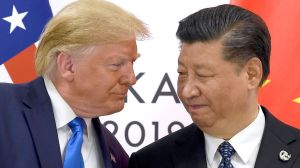The Murree spirit
The stage is set. President Pervez Musharraf has summoned the National Assembly session for March 17.

The stage is set. President Pervez Musharraf has summoned the National Assembly session for March 17. This comes amidst high drama over who could be Pakistan’s next prime minister. On Sunday, in the “Murree Summit Declaration”, PML’s Nawaz Sharif and PPP’s Asif Ali Zardari agreed to form coalitions at the centre and in Punjab. They also agreed on the restoration of judges to their pre-November 3 status, saying a resolution to this effect would be passed within 30 days of the formation of the federal government (Dawn, March 10.) (The “summit” bred its own controversies, most notably with the absence of Makhdoom Amin Fahim, senior vice-president of the PPP, who till recently was believed to be the obvious choice to be prime minister.)
In The Friday Times, Najam Sethi called the accord a “remarkable development”. He wrote, “In some ways, the greater maturity has been shown by Nawaz Sharif while the greater courage has been shown by Asif Zardari.” Sharif resisted demands on his party to boycott the elections, says Sethi, and he has now dropped plans to immediately put parliament in confrontation with the president and the post-November 3 judiciary. Zardari has, in turn, stayed with Benazir Bhutto’s plan for transition to democracy. But has Musharraf made peace with the transition? “This reckless and arrogant attitude has to change. He must learn to zip up and take a back seat, otherwise he is bound to step on the people’s mandate and bruise the egos of the new parliamentarians, thereby precipitating another confrontation. At any rate, the PMLN and PPP will obtain a two-thirds majority in the senate elections next year and parliament will become strong enough to uncontroversially strip him of his extraordinary powers or send him packing if he remains obstreperous. The time will be right too because a Democratic administration in Washington may not be as enamoured of him as the Bush regime is today.”
Off to Arabia
On Thursday, The News reported that Zardari and Sharif will visit Saudi Arabia to seek economic assistance, including supply of oil on deferred payment. On Friday, the newspaper had an editorial on the subject: “It is also true the Saudis have bailed Pakistan out before. In 1998, an oil facility similar to the one likely to be sought now helped the country survive crushing sanctions imposed by the international community after it tested nuclear weapons in the hills of Balochistan. Today too, the Saudis have remained closely engaged in Pakistan — indeed at times apparently making an effort to micro — manage the country’s affairs. The return late in 2007 of the Sharifs and an offer made at the end of the same year to the deposed Chief Justice Iftikhar Muhammad Chaudhry to visit Makkah as a means to ease the stand-off between him and the Musharraf regime are just some examples of such intervention.”
Lahore again
On Tuesday two terrorist strikes in Lahore — one at the Federal Investigation Agency building and another in the residential Model Town — left more than 30 persons dead. From the Daily Times editorial the next morning: “The war is between Al Qaeda and its Taliban allies on the one hand and the state of Pakistan on the other. Under the new army chief Pakistan has been able to counteract the inroads made in many parts of Pakistan by the soldiers of the terrorist organisation. But unfortunately the army is increasingly worried about the lack of sufficient support from the public at large so that it can face up to the terrorists. Political activism in Pakistan is focused on the restoration of the judiciary and the ouster of President Pervez Musharraf. What the politicians and the media are ignoring at great risk is the country’s response to the takeover of its territories and the virtual free run of the country that the suicide bombers have today.”
Provincial promises
On Friday, Dawn had two articles examining the social and political context of the new governments in Sindh, the Northwest Frontier Province and Balochistan. In Sindh, writes Ayesha Siddiqa, the PPP will have to be sensitive to the MQM’s decision to sit it out in the opposition. Tracing demographic changes back to 1947, she explains the ethnic tensions in the province, saying, “The ethnic tension in urban Sindh can only be solved once the internal boundaries of the state are re-imagined. The conflict in Sindh needs political solutions.”
In Balochistan, say Sayeed Hasan Khan and Kurt Jacobsen, while the PMLQ is the single largest party, the PPP is suddenly more politically competitive with the party’s apology for Zulfikar Bhutto’s policies in the 1970s. In NWFP, the Awami National Party’s success brings back Gaffar Khan’s non-violent anti-imperialism. They recommend that the PPP use his grandson, Asfandyar Wali’s diplomatic skills to reach an accord with Kabul.
mini.kapoor@expressindia.com
Photos







- 01
- 02
- 03
- 04
- 05
























